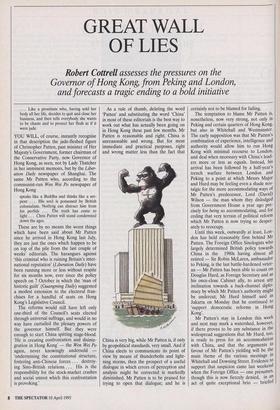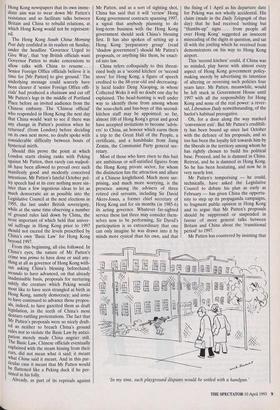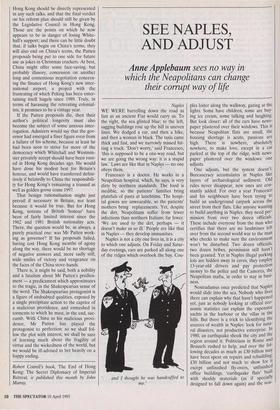GREAT WALL OF LIES
Robert Cottrell assesses the pressures on the
Governor of Hong Kong, from Peking and London, and forecasts a tragic ending to a bold initiative
.. Like a prostitute who, having sold her body all her life, decides to quit and close her business, and then tells everybody she wants to be chaste and to protect her flesh as if it were jade.
YOU WILL, of course, instantly recognise in that description the jade-fleshed figure of Christopher Patten, past minister of Her Majesty's Government, former chairman of the Conservative Party, now Governor of Hong Kong, as seen, not by Lady Thatcher in her imminent memoirs, but by the Liber- ation Daily newspaper of Shanghai. The same Mr Patten who, according to the communist-run Wen Wei Po newspaper of Hong Kong
speaks like a Buddha and thinks like a ser- pent . .. His soul is possessed by British colonialism. Nothing can distract him from his perfidy .. . The truth has come to light ... Chris Patten will stand condemned down the ages.
These are by no means the worst things which have been said about Mr Patten since he arrived in Hong Kong last July, they are just the ones which happen to be on top of the pile from the last couple of weeks' editorials. The harangues against 'this criminal who is ruining Britain's inter- national reputation' (Liberation Daily) have been running more or less without respite for six months now, ever since the policy speech on 7 October in which the 'man of historic guilt' (Guangming Daily) suggested a modest extension to the electoral fran- chises for a handful of seats on Hong Kong's Legislative Council.
The reforms would still have left only one-third of the Council's seats elected through universal suffrage, and would in no way have curtailed the plenary powers of the governor himself. But they were enough to start China spitting stage-blood. 'He is creating confrontation and disinte- gration in Hong Kong' — the Wen Wei Po again, never knowingly undersold — `undermining the constitutional structure, fostering anti-Chinese forces. . destroy- ing Sino-British relations . . . His is the responsibility for the stock-market crashes and social unrest which this confrontation is provoking.' As a rule of thumb, deleting the word 'Patten' and substituting the word 'China' in most of these editorials is the best way to work out what has actually been going on in Hong Kong these past few months. Mr Patten is reasonable and right; China is unreasonable and wrong. But for most immediate and practical purposes, right and wrong matter less than the fact that China is very big, while Mr Patten is, if only by geopolitical standards, very small. And if China elects to communicate its point of view by means of thunderbolts and light- ning storms, then the prospect of a useful dialogue in which errors of perception and analysis might be corrected is markedly diminished. Mr Patten is to be praised for trying to open that dialogue; and he is certainly not to be blamed for failing.
The temptation to blame Mr Patten is, nonetheless, now very strong, not only in Peking and certain quarters of Hong Kong, but also in Whitehall and Westminster. The early supposition was that Mr Patten's combination of experience, intelligence and authority would allow him to run Hong Kong with minimal recourse to London, and deal when necessary with China's lead- ers more or less as equals. Instead, his arrival has been followed by a half-year's trench warfare between London and Peking to a point at which Messrs Major and Hurd may be feeling even a shade nos- talgic for the more accommodating ways of Mr Patten's predecessor, Lord (David) Wilson — the man whom they dislodged from Government House a year ago pre- cisely for being so accommodating, and for ceding that very terrain of political reform which Mr Patten is now trying so desper- ately to reoccupy.
Until this week, outwardly at least, Lon- don has held reasonably firm behind Mr Patten. The Foreign Office Sinologists who largely determined British policy towards China in the 1980s having almost all retired — Sir Robin McLaren, ambassador to Peking, is the last battle-hardened veter- an — Mr Patten has been able to count on Douglas Hurd, as Foreign Secretary and as his once-close Cabinet ally, to arrest any inclination towards a back-channel diplo- macy by which Mr Patten's authority might be undercut; Mr Hurd himself said to Jakarta on Monday that he continued to 'support democratic reforms in Hong Kong'. Mr Patten's stay in London this week and next may mark a watershed, however, if there proves to be any substance in the widespread suggestions that Mr Hurd, too, is ready to press for an accommodation with China, and that the arguments ol favour of Mr Patten's yielding will be the main theme of the various meetings in Whitehall and Downing Street. Evidence to support that suspicion came last weekend when the Foreign Office — one presumes, though this is now fiercely denied, in an act of quite exceptional brio — briefed
Hong Kong newspapers that its own imme- diate aim was to wear down Mr Patten's resistance and so facilitate talks between Britain and China to rebuild relations, at which Hong Kong would not be represent- ed.
The Hong Kong South China Morning Post duly confided in its readers on Sunday, under the headline 'Governor Urged to Give Way', that lop British officials want Governor Patten to make concessions to allow talks with China to resume ... Senior Foreign Office officials believe it is time for [Mr Patten] to give ground.' The underlying message could scarcely have been clearer if 'senior Foreign Office offi- cials' had produced a chainsaw and cut off Mr Patten's legs in the middle of Portland Place before an invited audience from the Chinese embassy. The 'Chinese official' Who responded in Hong Kong the next day that China would 'wait to see if there was any change in Patten's position when he returned' (from London) before deciding on its own next move, no doubt spoke with considerable difficulty between bouts of hysterical mirth.
Should this prove the point at which London starts closing ranks with Peking against Mr Patten, then rarely can realpoli- tik have been allowed to prevail over such manifestly good and modestly conceived intentions. Mr Patten's fateful October pol- icy speech had at its core nothing more sin- ister than a few ingenious ideas to let as much democratic air as possible into the Legislative Council at the next elections in 1995, the last under British sovereignty, While at the same time observing a number of ground rules laid down by China, the most important of which held that univer- sal suffrage in Hong Kong prior to 1997 should not exceed the levels prescribed by China's own 'Basic Law' for Hong Kong beyond 1997.
From this beginning, all else followed. In China's eyes, the nature of Mr Patten's crime was primo to have done or said any- thing at all as governor of Hong Kong with- out asking China's blessing beforehand; secundo to have advanced, on that already inadmissible basis, proposals for nurturing subtly the creature which Peking would most like to have seen strangled at birth in Hong Kong, namely democracy; and tertio to have continued to advance those propos- als, indeed, to have gazetted them as draft legislation, in the teeth of China's most denture-rattling protestations. The fact that Mr Patten's proposals were so nicely draft- ed as neither to breach China's ground rules nor to violate the Basic Law by antici- pation merely made China angrier still. The Basic Law, Chinese officials eventually explained with the steam hissing from their ears, did not mean what it said; it meant What China said it meant. And in this par- ticular case it meant that Mr Patten would be flattened like a Peking duck if he per- sisted in his folly. Already, as part of its reprisals against Mr Patten, and as a sort of sighting shot, China has said that it will 'review' Hong Kong government contracts spanning 1997, a signal that anybody planning to do long-term business with the Hong Kong government should seek China's blessing first. It has also spoken of setting up a Hong Kong 'preparatory group' (read 'shadow government') should Mr Patten's proposals, or anything like them, be enact- ed into law.
China refers colloquially to this threat- ened body as a 'second kitchen' or 'second stove' for Hong Kong, a figure of speech credited to the 88-year-old and decreasing- ly lucid leader Deng Xiaoping, in whose Collected Woks it will no doubt one day be explained. The head-hunting is well under way to identify those from among whom the sous-chefs and bus-boys of this second- kitchen staff may be appointed: so far, almost 100 of Hong Kong's great and good have accepted invitations to become 'advis- ers' to China, an honour which earns them a trip to the Great Hall of the People, a certificate, and a handshake from Jiang Zemin, the Communist Party general sec- retary.
Most of those who have risen to this bait are ambitious or self-satisfied figures from the Hong Kong private sector, for whom the distinction has the attraction and allure of a Chinese knighthood. Much more sur- prising, and much more worrying, is the presence among the advisers of three retired civil servants, including Sir David Akers-Jones, a former chief secretary of Hong Kong and for six months (in 1985-6) its acting governor. Whatever far-sighted service these last three may consider them- selves now to be performing, Sir David's participation is so extraordinary that one can only imagine he was drawn into it by minds more cynical than his own, and that the fixing of 1 April as his departure date for Peking was not wholly accidental. His claim (made in the Daily Telegraph of that day) that he had received 'nothing but "thumbs-up" signs . . . from people all over Hong Kong' suggested an innocent misreading of the digits in question, and sat ill with the jostling which he received from demonstrators on his way to Hong Kong airport.
This 'second kitchen' could, if China was so minded, play havoc with almost every aspect of Hong Kong government policy- making merely by advertising its intention of altering or reversing such policies four years later. Mr Patten, meanwhile, would be left stuck in Government House until 1997 with all the responsibility for Hong Kong and none of the real power: a rever- sal, Liberation Daily notwithstanding, of the harlot's habitual prerogative.
Oh, for a door along the way marked 'convenient exit'. But Mr Patten's credibili- ty has been bound up since last October with the defence of his proposals, and so too has been the loyalty felt towards him by the liberals in the territory among whom he has rightly chosen to build his political base. Proceed, and he is damned in China. Retreat, and he is damned in Hong Kong. So he has been hesitating, and now he is very nearly lost.
Mr Patten's temporising — he could, technically, have asked the Legislative Council to debate his plan as early as February — has given China the opportu- nity to step up its propaganda campaigns, to fragment public opinion in Hong Kong and to argue that Mr Patten's proposals should be suppressed or suspended in favour of more general talks between Britain and China about the 'transitional period' to 1997. Mr Patten has countered by insisting that 'In my time, such playground disputes would be settled with a handgun.' Hong Kong should be directly represented in any such talks, and that the final verdict on his reform plan should still be given by the Legislative Council in Hong Kong. Those are the points on which he now appears to be in danger of losing White- hall's support; and there can be little doubt that, if talks begin on China's terms, they will also end on China's terms, the Patten proposals being put to one side for future use as jokes in Christmas crackers. At best, China might offer some face-saving, but probably illusory, concession on another long and contentious negotiation concern- ing the finance of Hong Kong's new inter- national airport, a project with the frustrating of which Peking has been enter- taining itself hugely since 1989. Truly, in terms of harassing the retreating colonial- ists, it promises to be a vintage year.
If the Patten proposals die, then their author's political longevity must also become the subject of some anxious inter- rogation. Admirers would say that the gov- ernor had emerged a finer figure even from a failure of his scheme, because at least he had been seen to strive for more of the democracy which Whitehall and Westmin- ster privately accept should have been root- ed in Hong Kong decades ago. He would have done his modest best for Britain's honour, and would have transferred defini- tively if belatedly to China the responsibili- ty for Hong Kong's remaining a trussed as well as golden goose come 1997.
That benign rationalisation might just prevail if necessary in Britain, not least because it would be true. But for Hong Kong, notions of British 'honour' have been of fairly limited interest since the 1962 and 1981 British nationality acts. There, the question would be, as always, a purely practical one: was Mr Patten work- ing as governor? If his proposals failed, having cost Hong Kong months of agony along the way, there would be no shortage of negative answers and, more sadly still, wide smiles of victory and vengeance on the faces of the China stove-hands.
There is, it might be said, both a nobility and a fatalism about Mr Patten's predica- ment — a predicament which approximates to the tragic, in the Shakespearian sense of the word. The Shakespearian protagonist is a figure of undoubted qualities, exposed by a single precipitate action to the caprice of a malicious providence, and enmeshed in torments to which he must, in the end, suc- cumb. With China as his malicious provi- dence, Mr Patten has played the protagonist to perfection: so we shall fol- low the plot with interest, we shall be sure of learning much about the fragility of virtue and the wickedness of the world, but we would be ill-advised to bet heavily on a happy ending.
Robert Cottrell's book, The End of Hong Kong: The Secret Diplomacy of Imperial Retreat is published this month by John Murray.




























































 Previous page
Previous page